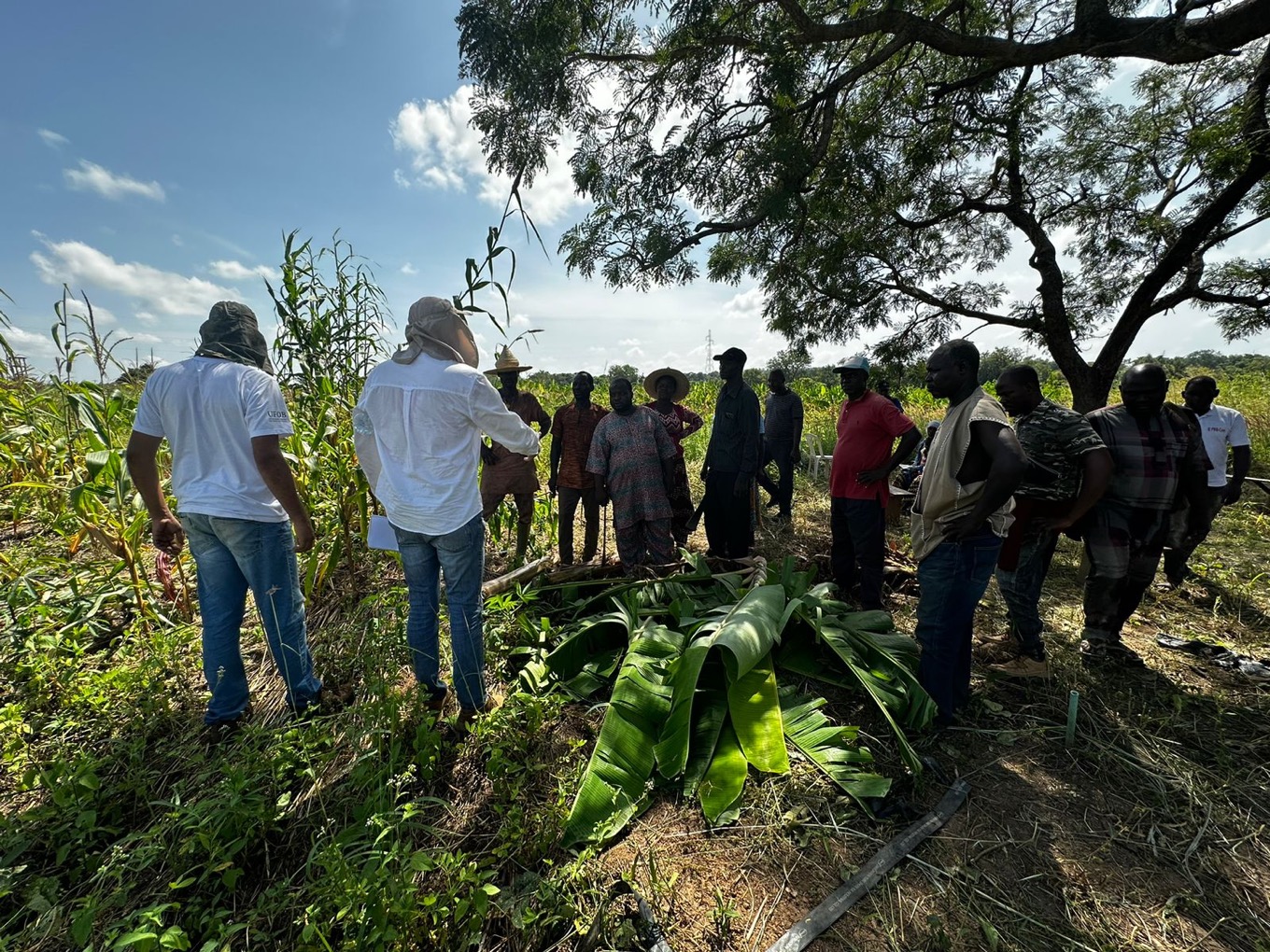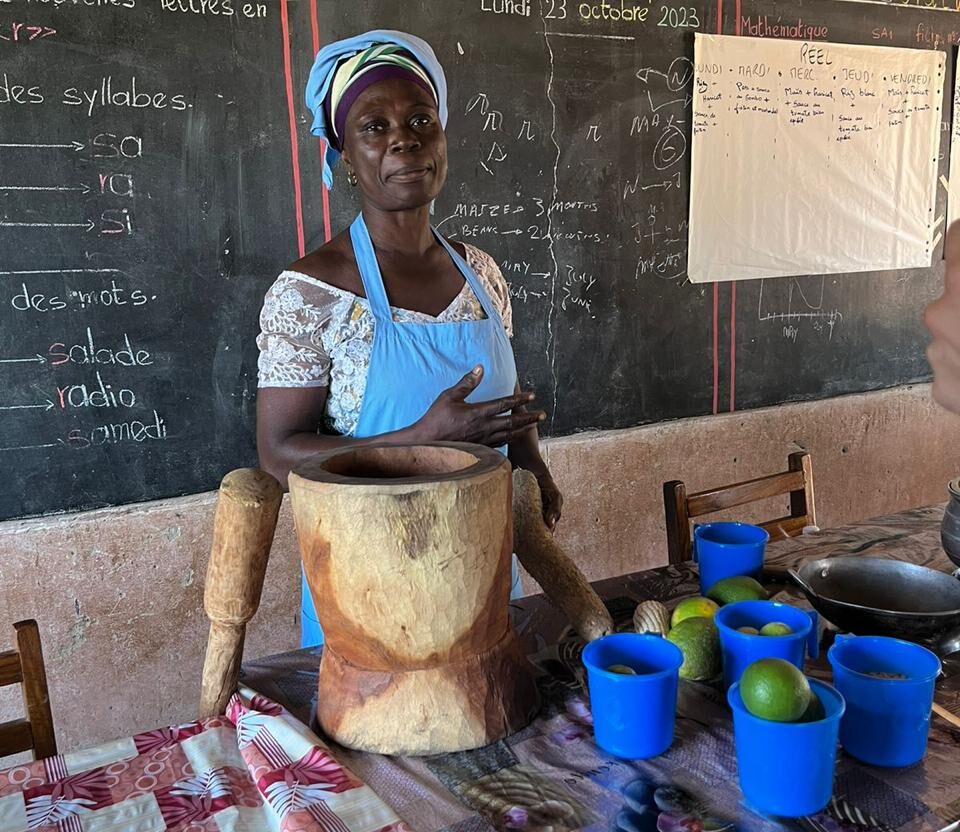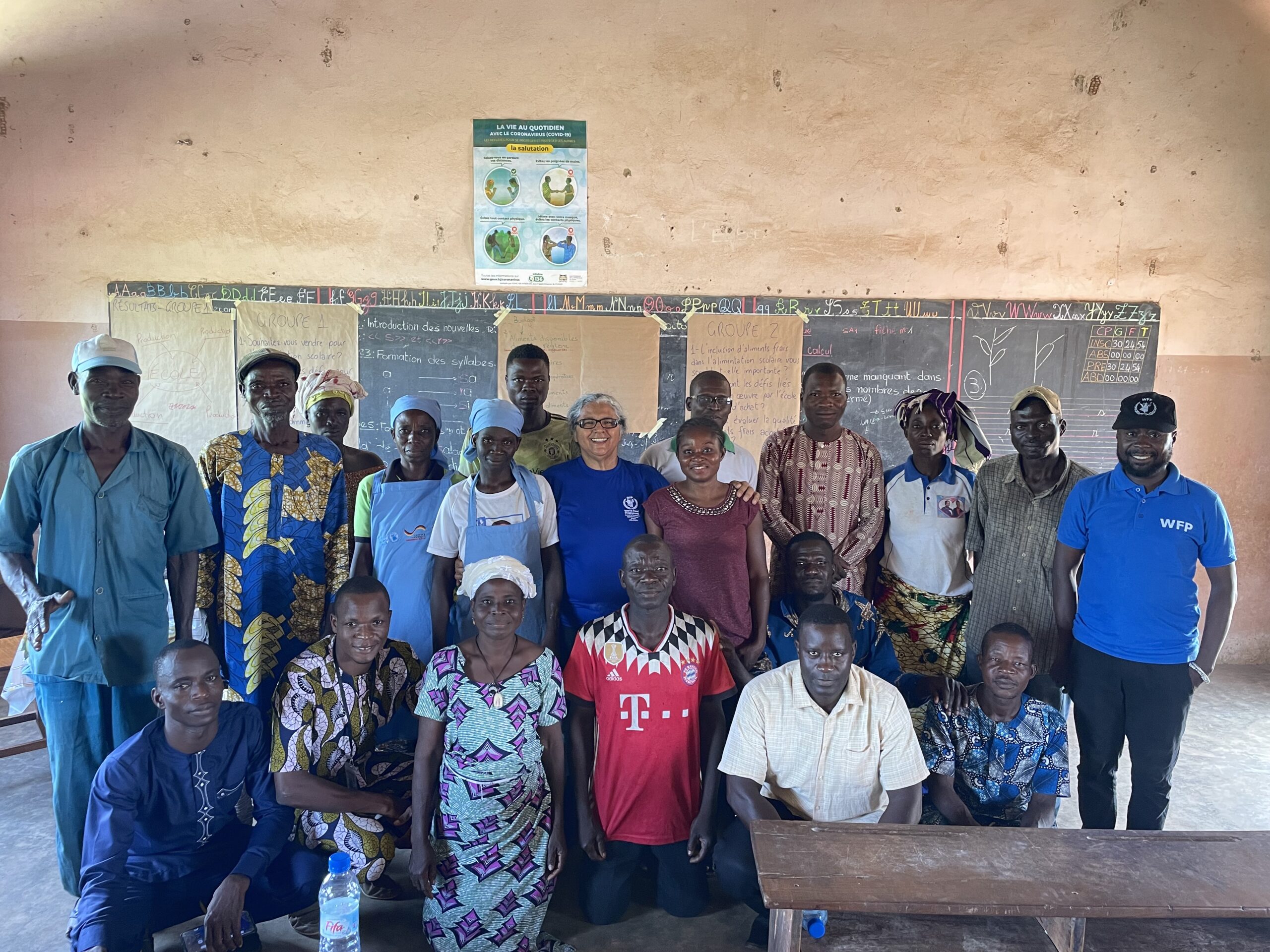
In October, the Beyond Cotton project team carried out its second mission to Benin to continue the technical activities in the Donga department and to develop the political agenda in Cotonou. The aim of the mission was to conduct activities in the areas of nutrition and agriculture based on technical support from the Federal University of Western Bahia (UFOB), to align the project’s activities with the country’s Strategic Plan and to hold a meeting of the Project Monitoring Committee to approve the activities set out in the 2024-2025 Annual Operating Plan.
The delegation visited a World Food Programme (WFP) warehouse in Natitingou, where yellow peas, oil, corn and rice are stored, as well as the Sorou cooperative, which processes rice produced by farmers in the region. The cooperative is in the process of training with the project team to adapt to WFP’s quality standards and regulations so that it can participate in institutional purchasing processes starting in 2024.
The cooperative operates nationwide and has more than 2,000 female farmers who sell parboiled rice nationally and internationally under contracts of at least 10,000 tonnes. In 2023, they had 400,000 tonnes of rice consumed domestically and have already exported 1 million tonnes to Nigeria. In Natitingou, the cooperative has around 300 members.
In general, the female farmers take the bags of raw rice to the cooperative’s warehouse, where they are weighed and washed to begin the parboiling process. In order to maximise resources and reduce environmental impact, the cooperative uses the rice bran and sawdust to make briquettes, which are used instead of firewood for the boilers.
In the village of Katabam, the UFOB has been supporting the development of two demonstration areas in the producers’ co-operative in the village of Ghomodou. There are two plots based on the agroforestry syntropic farming system, the first area with cassava, beans, soya, mango and papaya; and the second with cotton, okra and beans. During the activities conducted with the UFOB, the farmers were able to ask questions about planting, soil fertility management and aspects of pruning fruit trees.
To control pests, bio-inputs were made to maintain plant fertility and combat pests. Bio-inputs have been widely used in organic production areas in Brazil, which is considered a good practice in sustainable agriculture using materials collected in the cooperative’s own area that can be replicated in farmers’ production areas at low cost.
With the aim of combining the actions carried out by the agriculture and nutrition activities, Maria Luiza, good practice consultant for the Beyond Cotton project at the WFP Centre of Excellence, led a workshop on the concept of local purchases from family farming for institutional markets, applying the case of Benin’s National Integrated School Feeding Programme.
The workshop was structured in two focus groups: one made up of farmers, cooperative representatives and rural extension technicians; and the other made up of school cooks and representatives of local NGOs responsible for monitoring Benin’s school feeding programme. At the end of the workshop, the participants were able to see that the supply of food for school meals is seen as a feasible possibility by farmers, with the main challenges being to improve production capacity, include a variety of products, means of transport and adequate forms of payment.

Nutrition activities
The first nutrition activity, aimed at the school cooks, had the objective of designing menus that were nutritionally appropriate and compatible with the local reality. The cooks organised information on the menus most commonly used in the community. The first, the real menu, describes the meals commonly served at the school during the week. In the ideal menu, the cooks consider the best possible choices for a week’s operation of the school, considering a context of full access to all the food, utensils and physical structure.
The third menu is the possible menu. With it, all the participants recapped the points discussed in order to collectively draw up a possible menu considering a period from Monday to Friday in which the school could offer adequate, healthy and tasty meals, with an emphasis on traditional recipes and typical local fruit.
The second food and nutrition education activity was aimed at primary school children. During the activity, the students represented an adult person with a specific profession and, in an illustrative way using grains, the children indicated which types of food would be necessary for the full development of this adult. The aim of this activity was to strengthen the children’s prospects for the future and, at the same time, to present the different food groups so that they understood the importance of a diversified diet.

Project impact
The Beyond Cotton project in Benin has been instrumental in progressively increasing the purchase of local food. In 2021, the project made its first purchase of 300 tonnes of white maize and, in 2023, this increased to 6,000 tonnes. Thanks to the accompaniment provided to the cooperatives over the last few years, the project has supported the Beninese government in buying locally for the National Integrated School Feeding Programme (2021), the aim of which is to cover 100% of the country’s schools with at least one hot meal a day by 2026.
At the moment, the country office’s efforts have been to accompany the programme and focus actions on local production and capacity building in agriculture-sensitive nutrition actions. This important theme has served as a guide for discussing the extension of the project in the country until 2025, with a redesign of actions to integrate the production of dried and fresh food and local purchasing for school meals.
During the Project Monitoring Committee meeting, in addition to approving the activities planned in the country project, new actions will be included in order to catalyse the results expected by the government. Actions will be carried out to facilitate access to water, sustainable farming practices, nutrition-sensitive farming approaches and proposals for local purchasing methodologies, with a focus on the production and commercialisation of fresh food for schools.
There was also a courtesy visit at the invitation of the Brazilian ambassador to Benin, Regina Bittencourt, with the entire delegation and project team present to inform the ambassador about the activities that will be carried out over the next few years in partnership with the Brazilian government.
At the end of the mission, there was a restitution meeting with the director and deputy director of the country office to discuss the next actions for 2024 and 2025 with a focus on local food purchasing, good practices in sustainable agriculture and agriculture-sensitive nutrition.
The Federal University of Western Bahia took part in the technical mission, with the presence of Professor Débora Porcino, from the Nutrition department, and Professor Mario Alberto, from the Geography department of the Federal University of Western Bahia. The mission was also attended by Marenilson Batista, director of the technical assistance and rural extension department of the Ministry of Family Agriculture.
The political agenda included the participation of the Brazilian Cooperation Agency and Benin’s Ministry of Agriculture, Fisheries and Livestock, the Federal University of Western Bahia and the project’s technical team in the country. Also taking part in the mission were the country office’s programme teams and two representatives from the Ministry of Foreign Affairs, especially from the Americas.
Beyond Cotton is a joint initiative of the WFP Centre of Excellence and the Brazilian Government, through the Brazilian Cooperation Agency (ABC, in Portuguese), with the financial support of the Brazilian Cotton Institute (IBA, in Portuguese).




